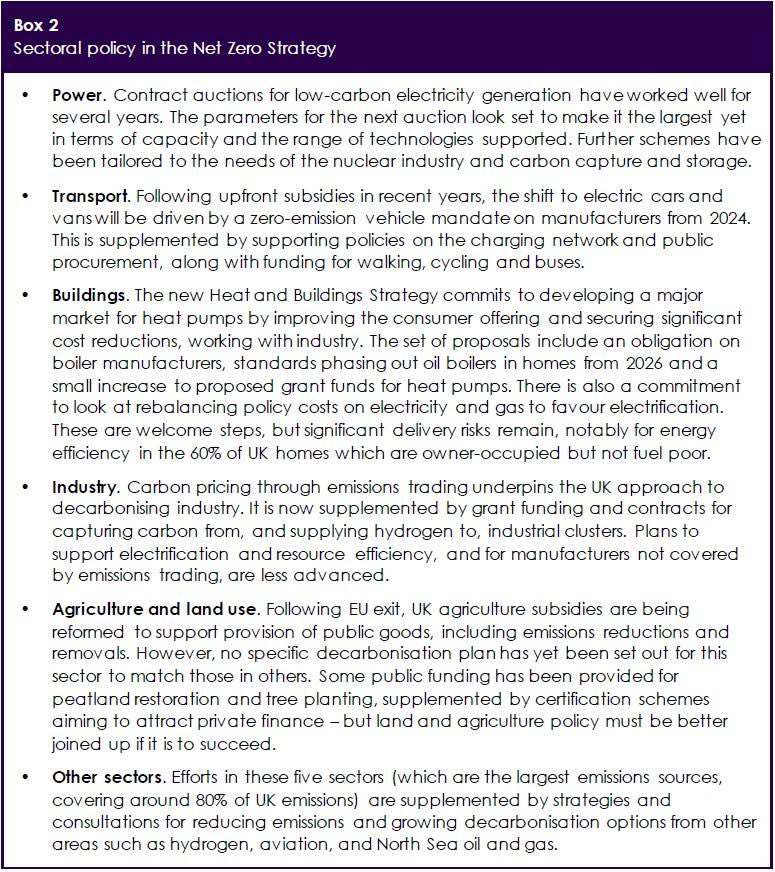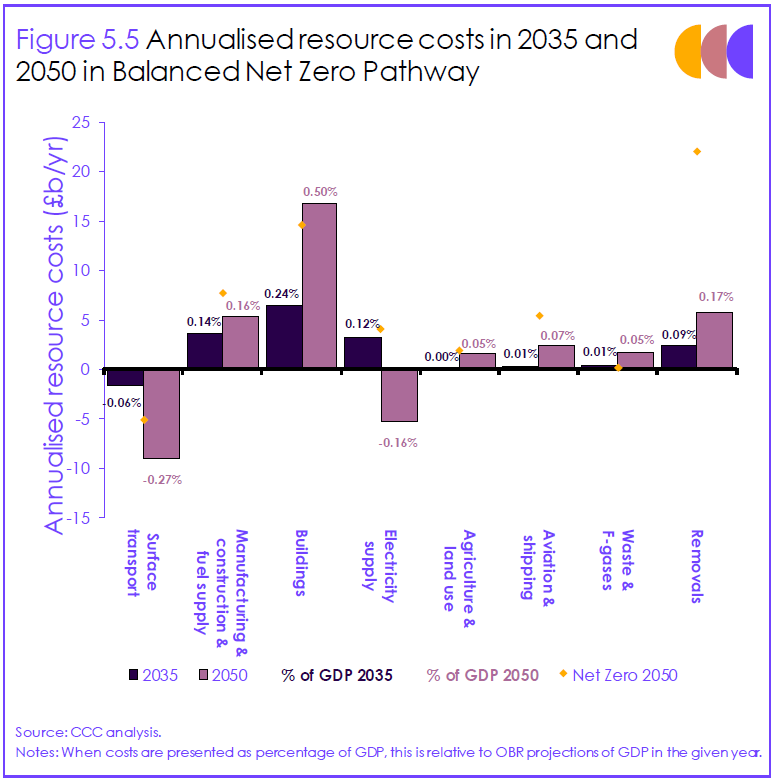
Just published, our independent assessment of the UK's new Net Zero strategy.
bit.ly/3vJnNIV
Overall, we see this as a big step forward. It’s ambitious and broad in scope, with credible mechanisms to drive delivery and scale up private investment.
@theCCCuk
bit.ly/3vJnNIV
Overall, we see this as a big step forward. It’s ambitious and broad in scope, with credible mechanisms to drive delivery and scale up private investment.
@theCCCuk
Until now, only @theCCCuk had offered an advisory path(s) to Net Zero. But the Climate Change Act says it's the responsibility of government to make a plan to meet the legal targets set by Parliament. Now we have the Government's *own* plan for meeting the UK's emissions targets.
That is significant, because this is now a basis for delivery and implementation - not just advice by the CCC but a *plan* from government that can be scrutinised and used to assess future progress.
We will now do just that.
We will now do just that.
It sets out a clear range for each sector of the economy to contribute to Net Zero. The ranges are a sensible reflection of the uncertainty - around a central delivery path that keeps multiple possible scenarios in play. Overall, the sectoral ambitions seem credible.
All sectors contribute, including hard to decarbonise ones. Although it’s clearer in some areas how that will be achieved than in others (more on that later). Known technologies are prioritised, and greenhouse gas removals are only supplementary (a worry prior to publication).
Here’s how the overall ambition compares with the ‘Balanced Pathway’ recommended by @theCCCuk last year.
Overall emissions will have to be in the lower half of the government’s range to deliver the Sixth Carbon Budget, but that doesn’t seem too unreasonable 15 years out.
Overall emissions will have to be in the lower half of the government’s range to deliver the Sixth Carbon Budget, but that doesn’t seem too unreasonable 15 years out.
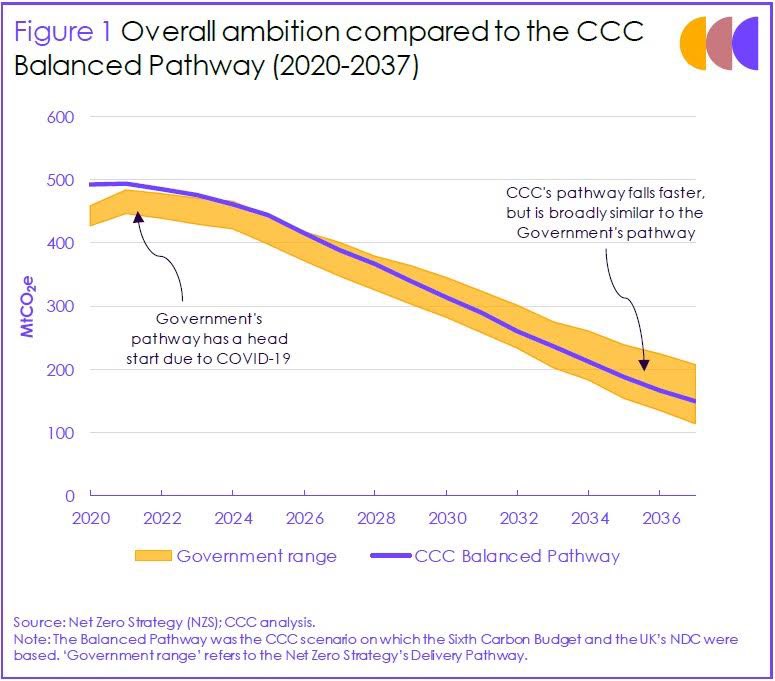
And here’s a great chart on how the government’s sectoral ambitions compare with our Balanced Pathway.
It’s broadly similar but government is *more* ambitious on buildings (you read it right), and less ambitious on fuel supply (because the North Sea Transition Deal falls short).
It’s broadly similar but government is *more* ambitious on buildings (you read it right), and less ambitious on fuel supply (because the North Sea Transition Deal falls short).
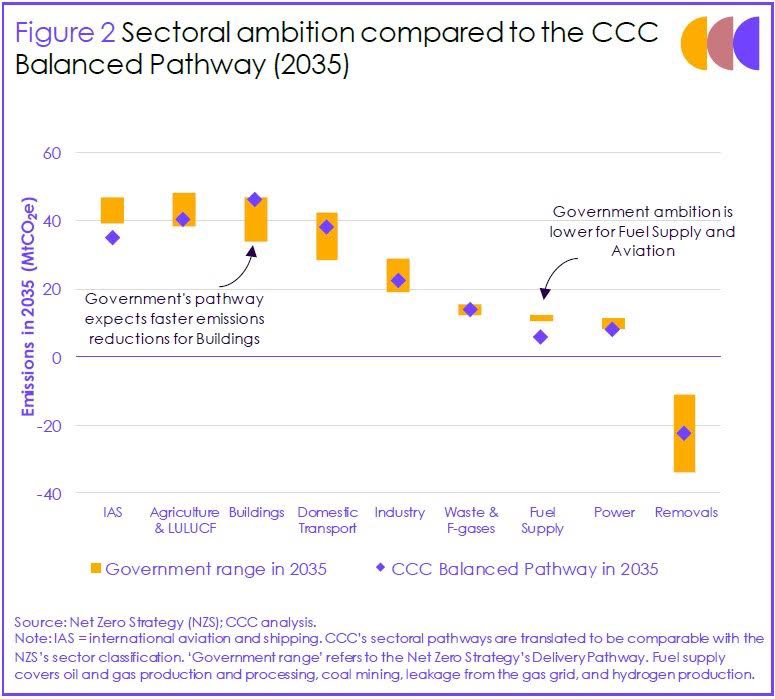
The Government identifies the need for £50-60bn of extra capital investment across the economy from 2030 to reach Net Zero - we said £50bn. For these investments, the country will see reduced operating costs in later years - just as we concluded.
The strategy also highlights different ways to get to Net Zero, depending on how things develop over the next decade. But it’s they are also clear about what needs to be delivered over that decade, as options and technologies mature.
That’s a sensible, realistic approach.
That’s a sensible, realistic approach.
There’s £1.5 billion of public funding for innovation over 2022-24. This is clearly a big theme - and not just bleeding edge stuff. There is a focus on the large markets that are just around the corner for emerging technologies that will soon need to become everyday technologies.
Overall, the strategy makes big decisions: fully decarbonised electricity by 2035. Phase out sales of fossil fuel cars by 2030. Boilers by 2035. Rapid electrification of transport, industry and heating. Supplemented by low carbon hydrogen, carbon capture and a change in land use.
Here’s a look at how the deployment paths look in comparison with our recommendations last year. Striking how similar many of these are. 
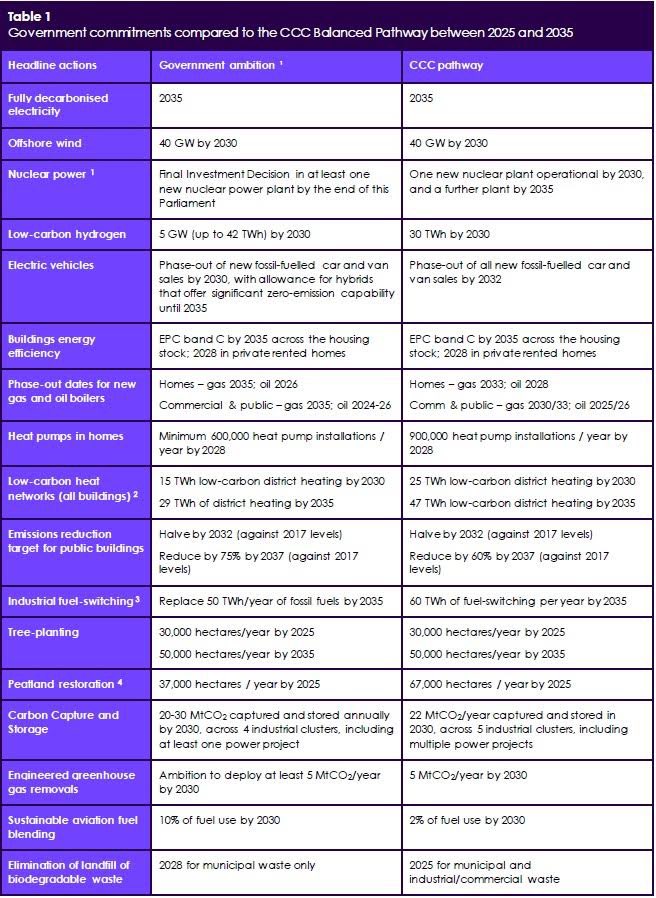
Clearly, it’s a very market-led strategy. Contract auctions for huge volumes of low carbon power. And a striking use of mandates - obligations on business to deliver the change. There is a mandate for electric vehicle supply. And a mandate on boiler manufacturers for heat pumps.
It’s noticeable how frequently government puts the onus on business to invest and bring down the cost to the consumer. Many have criticised low public spending in some areas, but the government seem to be taking a different route.
We shall see how that market-led approach fares.
We shall see how that market-led approach fares.
But there are gaps too. Notably, there are few details on delivery mechanisms for agriculture. We really need an agriculture and land decarbonisation strategy. It now stands out against the other sectors.
As others have noted, there is less emphasis on consumer and behaviour change. No room for diet change or limiting aviation growth here. It’s less an omission and more of a design feature, but we would say it makes the task bigger and makes it higher risk if tech doesn’t deliver.
Progress has also been made on the governance of Net Zero, including on how national and local government will work together (in England at least). Much less clear how this strategy dovetails with strategies in Scotland and Wales and Northern Ireland however.
Government hasn’t agreed with our suggestion of a Net Zero test for new developments. It’s not clear, therefore how we can avoid locking-in new high-carbon developments. That will continue to be a risk I think.
And considerably more action may be needed on protection of vulnerable households. The Treasury review spelled out some principles, but it didn’t really conclude how the tax system will be used to support a fair transition. Nothing on the replacement for fuel duties either (yet).
Crucially, this strategy shifts the focus. From ambition and target-setting to policy development and implementation. That’s to be applauded. There aren’t many other countries that have a plan as extensive as this - as we go into COP26 (none that we could see among the G20). 
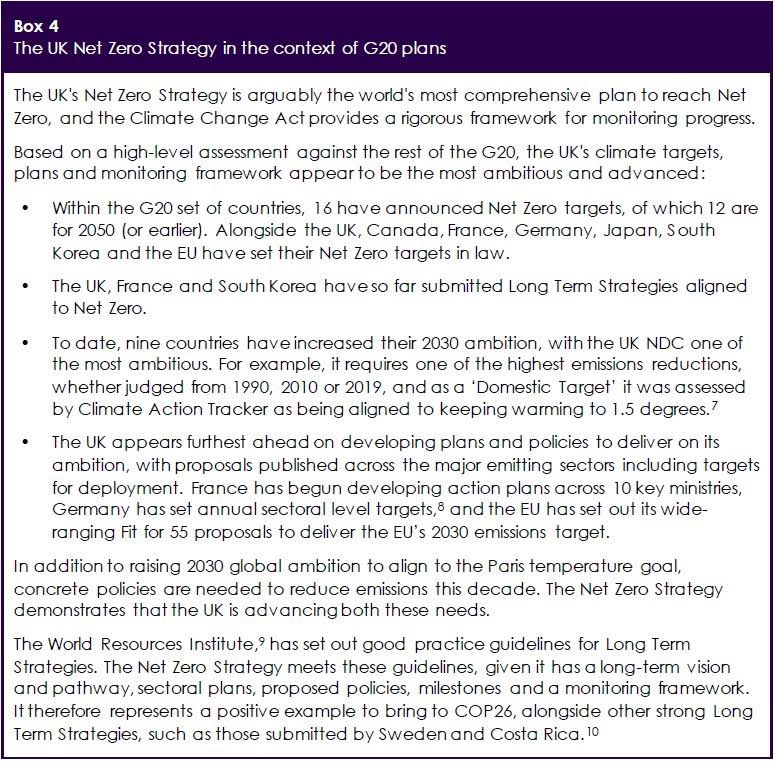
Implementation of this will be a huge task. Some policies are already in operation. But for others, we still have consultations to initiate and complete. There’s enough here to say that it’s consistent with our recommendation for full implementation by 2024.
But we’ll need pace.
But we’ll need pace.
We thought hard about where this places things. We don’t have enough information yet to know precisely how each policy will deliver (government hasn’t been as transparent on this as they could have been). We’ll keep working on that and present more info on the delivery status.
And clearly not all the policies and mechanisms have been confirmed - so there is still a lot to be concluded and delivered after COP26. We’ll try to keep shining a light on these, as we’re tasked under the Climate Change Act.
But this sets an ambitious, credible path for UK decarbonisation, consistent with tough territorial emissions targets in the near and long-term that we (and others) assess to be in line with the demands of the Paris Agreement.
Implementation and delivery is what matters now.
Implementation and delivery is what matters now.
I want to say a big thanks to the team @theCCCuk - they have worked so hard to produce this assessment in the last few days. It’s a really accessible and readable report (and concise). You can dip in to any of the challenges you might be interested in.
bit.ly/3vJnNIV
bit.ly/3vJnNIV
• • •
Missing some Tweet in this thread? You can try to
force a refresh

